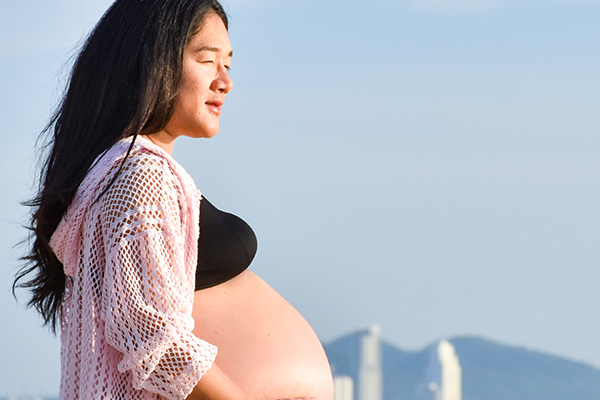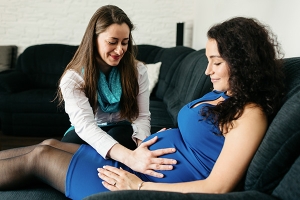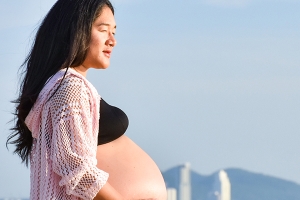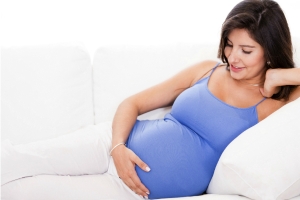
It’s not uncommon for maternal wellbeing to fluctuate during the final trimester of pregnancy or the 12 weeks following birth (fittingly known as the fourth trimester). These are periods of intense physical and emotional change. Carefully tending to one or more areas of personal wellbeing can help new moms feel lighter and more connected as they grow into the next stages of motherhood. Here’s a closer look at wellness needs during the third and fourth trimesters.
THIRD TRIMESTER
Healthy Eating
In the third trimester, continue to choose a healthy variety of foods and drink plenty of fluids. During pregnancy, a woman’s body needs 300 additional calories per day. That’s about the size of a small meal or large snack. Eating a balanced diet while minimizing sweets and fats can help you feel your best during this exciting time. “My recommendation to pregnant people would be to listen to their body and get the nutrients they need,” says Dr. Jaime Friedman of Children’s Primary Care Medical Group. “Pregnancy isn’t a time for a fad diet or to be calorie conscious.”
Exercise and Movement
During this stage of pregnancy, exercise can greatly improve a woman’s quality of life. According to the Mayo Clinic, getting enough exercise can improve mood and energy levels. It can help you sleep—and might even shorten labor! Choose an activity that feels good and be sure to get a thumbs up from your healthcare provider.
Skincare
According to Kristina Kennett, esthetician and owner at White Rabbit Day Spa in North Park, some women experience flawless, plump and rosy skin during pregnancy. The “pregnancy glow” is a happy byproduct of improved circulation. Unfortunately, fluctuating hormones can cause some unpleasant changes in the skin as well. “It is very common for clients to experience skin sensitivity during pregnancy,” says Kennett. “I recommend using a simple, gentle skincare routine during this time. Intense exfoliating or heavier fragrance may be too much for the skin to handle. Remember to keep it simple and focus on nourishing, healing and protecting your skin.”
Kennett and her team offer custom facials, personalized to any stage of a client’s life. They also offer consultations (in-person or virtual) to help pregnant and postpartum women adjust skincare routines. Learn more at www.whiterabbitdayspa.com.
Mental Health
It’s normal to feel some anxiety and fear leading up to a big life change. Notice your thoughts and feelings each day and share them with someone you trust. Steady yourself by avoiding other major life changes during this time. It also helps to be realistic about how much you can accomplish in a day and how much rest you need to feel well. If troubling thoughts and feelings are persistent, don’t hesitate to ask a doctor or mental health professional for advice. If it feels hard to talk about, send an email to your healthcare provider, or ask a loved one to make contact on your behalf.
Postpartum Health Alliance is an excellent local resource for new parents experiencing mental health changes. Find a crisis line, online screening test and additional support at www.postpartumhealthalliance.org. For immediate support, call the San Diego Access and Crisis Line at 1-888-724-7240.
Community Support
This is a great time to foster connections with friends and family, especially those who know how it feels to be pregnant! Spend time with people who make you feel good. Accept help when it’s offered and reach out for help when needed. Research shows that people who feel a strong sense of community experience better mental and physical wellness. So, say yes to the family potluck, and invite those neighbors for a walk. You’ll be glad you did!
FOURTH TRIMESTER
Healthy Eating
Postpartum bodies need even more calories per day—about 500 more than before pregnancy. That’s about the size of an extra daily meal. “After delivery, your body is tasked with making breastmilk,” says Friedman. “This means you will need to replace the nutrients your body is taking to give to your baby. Continue to take your prenatal vitamins, get plenty of calcium and drink lots of water.”
Exercise and Movement
Your healthcare provider will likely encourage you to wait 4-8 weeks after delivery before resuming a normal exercise routine. Ask about movement that is safe and beneficial in the meantime—like going for short walks or resuming Kegel exercises. Once you get the green light, start slow. Give yourself time to gradually restore your strength. It might help to include your newborn in those early exercise plans. Check out www.sandiegofamily.com/parenting/baby/mom-baby-fitness-class-san-diego for our roundup of baby and me fitness classes.
Skincare
After baby arrives, skin concerns might arise due to a combination of lifestyle and hormone changes. “After delivery, it is common to experience hormonal breakouts which can last one to two months,” says Kennett. “In some cases, women experience acne until their menstrual cycle balances out again. Breastfeeding can take a lot of energy and nutrients from the body, causing skin to become dehydrated. Lack of sleep is also common, which causes dullness in the skin and dark circles under the eyes.”
Be gentle with yourself. It might be a while before you’re ready to devote time and mental energy to a solid skincare routine. In the meantime, keep up the fluid intake and seize those rare opportunities to rest.
Mental Health
Mental health changes are common for new parents—both moms and dads. If your thoughts and feelings are concerning, find a way to alert your provider. Help is available and you don’t have to suffer. “If at any time a new parent is feeling extreme fatigue, sadness or disengagement, seek help,” says Friedman. “Any thoughts of harming yourself or your baby are very concerning and should be addressed right away.” Help is available!
Community Support
The postpartum period can feel hectic. You might feel like your home is a mess. You might feel like your hair is a mess. Find time for community anyway! “This is where your support system is incredibly helpful,” says Friedman. “Call on people to help with meals or housework so you can get the rest you need.”
Anne Malinoski is a contributing writer and mother of two boys.
__________









